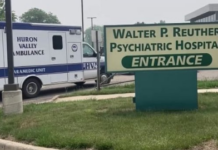Despite the fact that clinical practice guidelines specifically recommend against the use of more than one antipsychotic at once, new research reveals that as many as 12% of all psychiatric patients are discharged with multiple prescriptions for these drugs. The latest study, published open-access this week in the Journal of Psychiatric Practice, finds that the prescription of multiple antipsychotics continues to be an issue affecting nearly ten thousand patients every year in psychiatric hospitals alone.

“Despite the lack of empirical evidence that antipsychotic polypharmacy produces superior outcomes to antipsychotic monotherapy, clinicians continue to prescribe multiple antipsychotic medications for patients with a diagnosis of schizophrenia,” write the researchers, led by Glorimar Ortiz, Vera Hollen, and Lucille Schacht, of the National Association of State Mental Health Program Directors Research Institute (NRI).
“There is clear evidence that antipsychotic polypharmacy presents complications for the patient, including risk of drug interactions, increased medication side effects, increased risk for metabolic disorders, and complex medication regimens, which may lead to medication non-adherence among patients.”
The study looked at data on all psychiatric patients discharged from inpatient hospitals in 2011. In total, they looked at over 86 thousand patients from 160 hospitals in 26 states. On average, more than one in ten patients (12%) being discharged from a state inpatient psychiatric facility were given more than one antipsychotic medication. The antipsychotic polypharmacy rate differed considerably between hospitals, one facility prescribed multiple antipsychotics to 57% of their discharged patients, for instance, while others followed guidelines and avoided this practice.
“Our findings showed that rates of antipsychotic polypharmacy differ by geographic region. The Northeast had the highest adjusted polypharmacy rate, with 26% of patients discharged on antipsychotic polypharmacy. In the West, 45% of patients were discharged on no antipsychotic medications, which converted to an adjusted polypharmacy rate of 20%.”
For patients diagnosed with ‘schizophrenia,’ the rate of antipsychotic over-prescription was even higher, affecting one in four of these patients. The data also revealed that patients who were in the hospital for more than 90 days were almost twice as likely to be discharged on antipsychotic polypharmacy.
****
ORTIZ, G., HOLLEN, V. and SCHACHT, L., 2016. Antipsychotic Medication Prescribing Practices Among Adult Patients Discharged From State Psychiatric Inpatient Hospitals. Journal of Psychiatric Practice®, 22(4), pp.283-297. (Full Text)















This doesn’t seem surprising at all. 2 or even 3 is very, very common in my experience. I’d say it’s true of more than half of discharged patients.
Report comment
Even Allen Frances has got this one. Stop giving people drug cocktails. Duh. Otherwise, expect illness, expect disability, and expect death. Giving people drug cocktails is more lethal than giving peoples a single pill for a single presumptive disorder. Much more lethal.
Report comment
Yes it is more lethal, all doctors should know that prescribing multiple antipsychotics will likely result in “psychosis,” caused by neuroleptic induced anticholinergic toxidrome. Which is NOT “schizophrenia,” since it’s cured by weaning the person off the antipsychotics.
And trying to cure the adverse effects of an antidepressant, with a “bipolar” misdiagnosis and by adding an antipsychotic or more antidepressants, will yield the same result. Since both the antidepressants and antipsychotics can cause anticholinergic toxidrome, a medically known iatrogenic drug poisoning.
https://en.m.wikipedia.org/wiki/Toxidrome
And the doctors can’t tell the central symptoms of anticholinergic toxidrome from “the classic symptoms of schizophrenia,” because they’re almost identical.
Report comment
Twenty years or so ago , I was on antipsychotic polypharmacy, and it was noticed by a outpatient nurse. She told me to question my psychiatrist about it. I said something to the effect of “What is the point?” ( in asking questions). It was a dictatorship.
If I recall correctly, I don’t think I was consuming them, since I was not in prison/hospital, and it wasn’t a problem. The shrink was under the delusion his prescribed “medicine” was working.
Report comment
Reminds me of an incident many years ago, where a patient whose GP had him on vitamins had his shrink tell him how well he looked and reminded him to keep taking his meds (which he hadn’t taken in 6 months) so his mental status would continue to improve.
Report comment
Hi, Mark. I’m in the same boat. How long should I be prepared to pretend to ingest this crap?
Report comment
RE:”How long should I …?”
I have no criminal record.
If you have some kind of history, those in power can claim the “medicine” is helping. I don’t know what a person does in this case. Court ordered drugging(long acting injection) takes place.
I went to the police for advice.
The police said I could ask(demand) another psychiatrist.
If you are too afraid you will not be able to do this. Many who have been tortured can not do/endure this confrontation with authority. Many can not be their own boss and need a “doctor” to talk to or confess their inner ideas(fears/worries) to.
The psychiatrist expected me to be addicted to the drugs. He wrote me a prescription-refill for several months, but I had already quit.
I never got another psychiatrist assigned to me/ you don’t show up for the appointment.
What do they do? I don’t know.
You can’t screw up once, like a normal person can make a mistake and be forgiven. The “mentally ill” are never forgiven for being human.
Report comment
Circa
I hope you don’t mind if I chime in here.
Perhaps raise the issue of gradual withdrawal and see how your doc reacts.
If (s)he is open to it, pretend to gradually come off. If not, just keep pretending to take them, especially if you are under a treatment order – if they know you’ve come off, you might get hit with depot injections as they HATE people who are “non-compliant” even if they obviously do better off the drugs – it’s a power thing…absolutely nothing to do with health care.
Report comment
Which goes to show that Peter Goetze is right – doctors can’t be trusted to even follow their own guidelines, let alone honestly evaluate the effectiveness of a drug or honestly inform their patients of the pros and cons and other viable alternatives.
—- Steve
Report comment
lucky896: I was on three antidepressants at the same time.I quit one in july.my sleeping problems started in
august.I quit no.#2 in october alot more side effects.Its December now.I think i’am over the worth part of the
side effects.I Hope and pray.still not sleeping.maybe 6 t0 8 hours a week if i’am lucky.I Don’t know whats up
ahead.I don’t want to go back on them.still taking no#3…I don’t know what to do and need help.forget the doctor hes no help.it was a doctor who started the problem in the first place….ANY ADVICE????
Report comment
Have you considered finding a group of people who have had similar concerns – a support group? You have to be careful that you don’t get one of those sponsored by the drug companies or the MH system – a lot of those are spouting propaganda and will tell you to get “back on your meds.” But I think other people who have had similar experiences are the best source of good advice about how to move forward, including others who have come off “ADs” in the past. This website can be a good source, and other internet communities can help, too.
Hope that helps a bit. There are a few good counselors around, or life coaches, so that might also be worth exploring, but you definitely have to shop around very carefully, because these days, it appears that most of the “professionals” involved in the system have bought into the label-and-drug philosophy.
Report comment